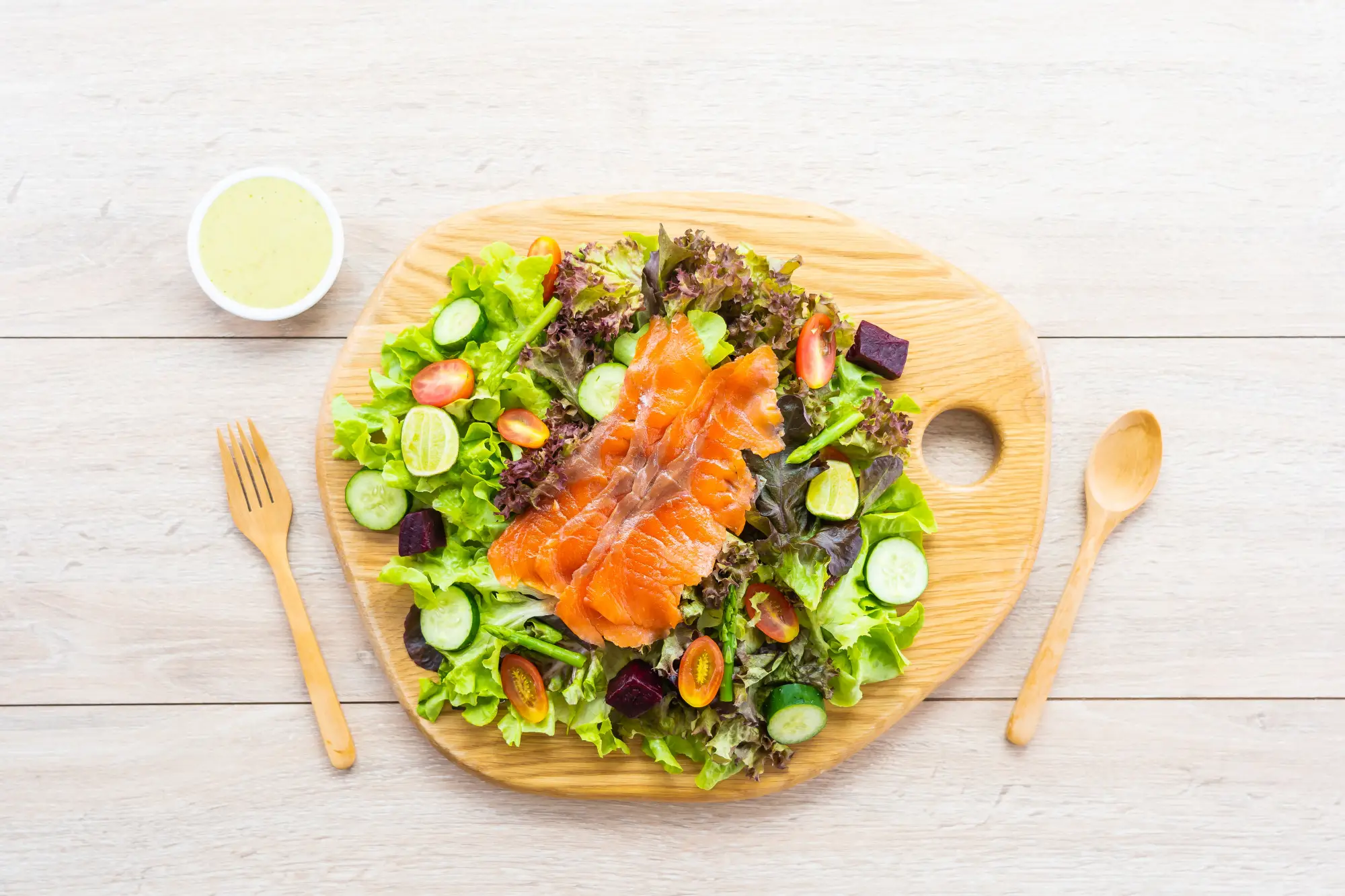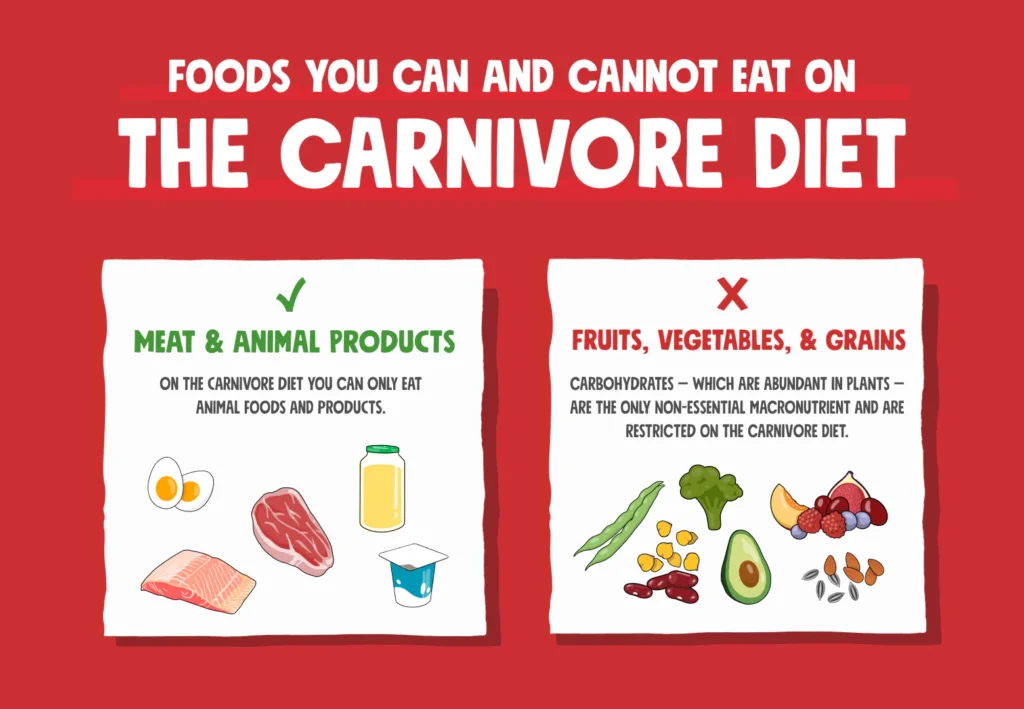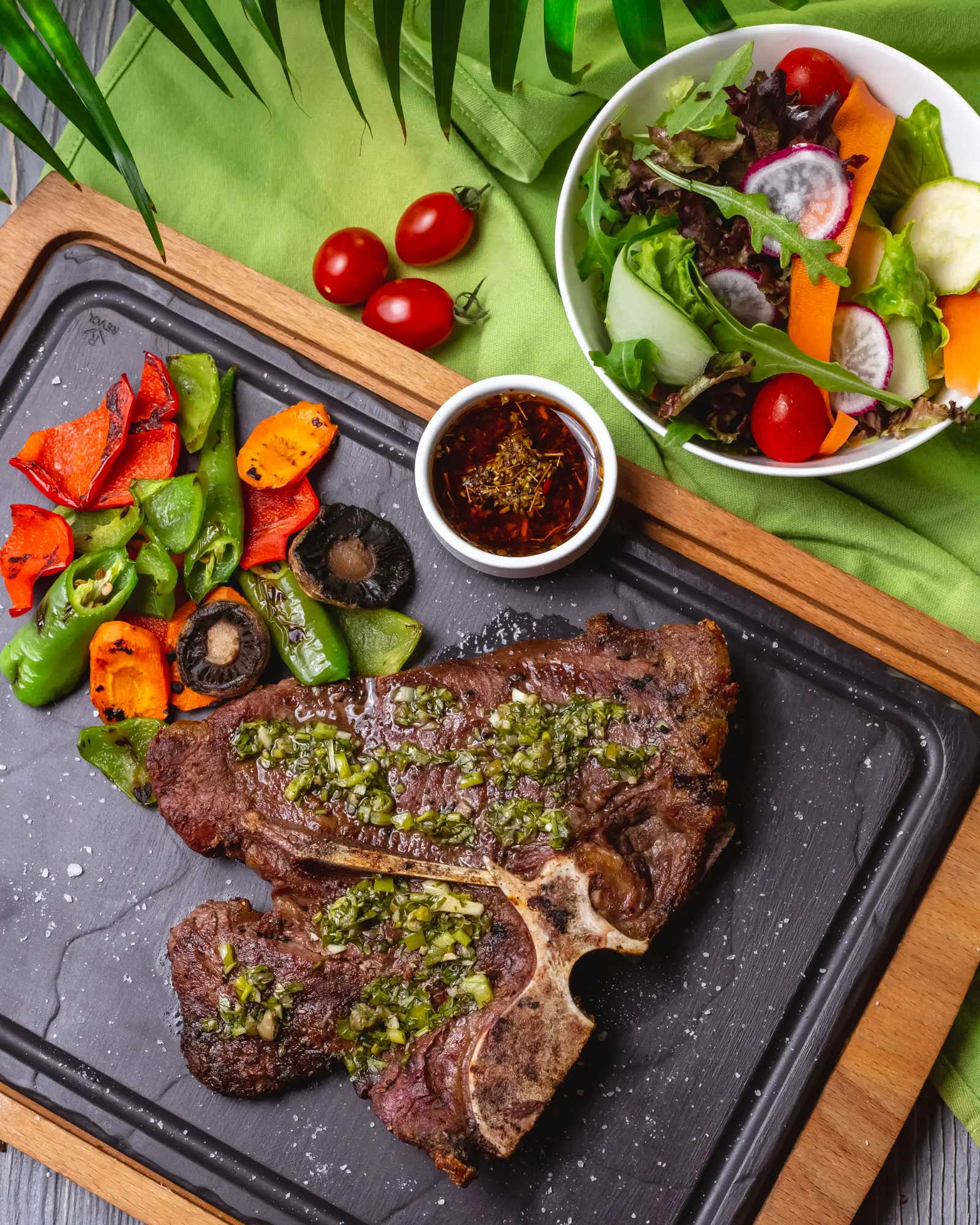Experience the stunning benefits of the carnivore diet meal plan—a meal plan that’s transforming lives with rapid weight loss, improved mental clarity, and reduced inflammation. This all-meat, no-carb diet is gaining attention for its powerful impact on health, despite its restrictive nature. Dive in to discover why this unconventional approach is making waves in the wellness world. Ready Set Go! We are going to explore a comprehensive 30 day carnivore diet meal plan as well as carnivore diet food list for you.
But before diving headfirst into a world of ribeyes and roasted chicken, it’s crucial to understand the “what,” “why,” and “how” of this unique carnivore diet meal plan approach.
Research indicates that adults following a carnivore diet encountered minimal adverse effects, reporting positive health outcomes and high satisfaction levels.
What is the Carnivore Diet
In its purest form, the carnivore diet eliminates all plant-based food groups, including fruits, vegetables, grains, and legumes. Proponents believe this approach aligns with our evolutionary blueprint and unlocks many health benefits. This animal based diet focuses solely on meat, poultry, fish, eggs, and some animal fats, like butter or ghee.
However, the carnivore diet meal plan isn’t a monolith. Variations exist, some incorporating dairy, eggs, and even honey, while others strictly adhere to meat and water. Regardless of the chosen path, the core principle remains animal products reign supreme.
Nutritional Facts of Carnivore Diet
So, what sets the carnivore diet apart from standard dietary recommendations? Proponents highlight several potential advantages, but it’s important to note that these require further research and may not be universally experienced:
Elevated Protein Intake
The emphasis on meat increases protein consumption, critical for building and repairing muscle, satiety, and hormone regulation. This high-protein diet can support weight management and athletic performance.
Reduced Carb Intake
Banishing sugary and starchy carbohydrates can stabilize blood sugar levels, manage insulin resistance, and promote weight loss. This low-carb diet aligns with the ketogenic approach, potentially offering similar benefits for some individuals.
Research suggests that the low-carbohydrate, ketogenic diet (LCKD) could be beneficial in enhancing glycemic control and decreasing medication reliance in individuals with type 2 diabetes.
Eliminating Gut Irritants
Some individuals with sensitivities to gluten, lectins, or other plant-based compounds find relief on the carnivore diet meal plan. This might be due to reduced gut inflammation and elimination of potential triggers.
Improved Nutrient Absorption
Advocates often claim better assimilation of nutrients from animal sources compared to their plant-based counterparts. However, more research is needed to support this claim conclusively.
Carnivore Diet Benefits: Carnivore Diet Before and After Results
The carnivore diet isn’t just another trend—it’s a dietary approach rooted in the idea that eating only animal products can lead to significant health benefits. If you’re looking for a way to lose weight, reduce inflammation, or boost mental clarity, the carnivore diet recipes could be the key.
Low Calorie Diet
Understanding your calorie needs is crucial before embarking on a carnivore diet. Several factors influence daily calorie requirements, including body composition, activity level, and metabolic rate.
Generally, carnivore diets recipes tend to be naturally lower in calorie density than standard diets due to the absence of processed foods and refined carbohydrates. This can promote satiety and weight loss, but individual needs vary. Consulting a registered dietitian or healthcare professional is recommended to determine personalized calorie goals and tailor your meat-based meals accordingly
Weight Loss Without Hunger
One of the primary benefits of the carnivore diet is rapid weight loss. By eliminating carbs, your body enters ketosis, burning fat for energy instead of glucose. This not only accelerates fat loss but also reduces hunger and cravings. Unlike other diets, where you might struggle with portion control, the carnivore diet allows you to eat until you’re satisfied while still shedding pounds.
Improved Mental Clarity
Many followers of the carnivore diet report enhanced mental clarity and focus. Without the blood sugar spikes and crashes caused by carbohydrates, your brain operates on a more stable and efficient fuel source—ketones. This can lead to better concentration, mood stability, and overall cognitive function.
Reduced Inflammation
Inflammation is at the root of many chronic diseases, including arthritis and heart disease. The carnivore diet, rich in omega-3 fatty acids from fatty fish and grass-fed meats, can help lower inflammation levels in the body. This reduction can alleviate symptoms of autoimmune conditions and improve overall joint and muscle health.
Enhanced Energy Levels
By cutting out carbs and relying on protein and fat, your body becomes more efficient at producing sustained energy. Many people experience increased stamina and endurance on the carnivore diet, making it popular among athletes and fitness enthusiasts.
Digestive Health
For some, eliminating plant foods can lead to significant improvements in digestive health. The carnivore diet may help reduce symptoms of IBS (Irritable Bowel Syndrome) and other gastrointestinal issues by removing potential irritants like fiber and plant-based anti-nutrients.
Simplified Eating
If you’re tired of complicated meal plans and calorie counting, the carnivore diet offers simplicity. With a focus on just a few types of food—meat, fish, eggs, and some dairy—you can streamline your eating routine while still getting all the nutrients you need.
Improved skin health
Some individuals experience clearer skin due to reduced gut inflammation and elimination of potential dietary triggers.
30-Day Carnivore Diet Meal Plan
Creating a 30-day carnivore diet meal plan involves a high-protein, zero-carb diet that focuses on animal-based foods, including carnivore snacks to keep you satiated between meals. Below is an example of a 30-day plan that balances variety and nutritional needs, while being rooted in the principles of the carnivore diet. This plan is backed by research and includes references for further reading. It’s important to consult a healthcare professional before starting this diet, as it is restrictive and may not be suitable for everyone.

Week 1: Introduction to Carnivore Diet
Goal: Transition into the diet, begin with more accessible meats.
Day 1-3
- Breakfast: Scrambled eggs cooked in butter
- Lunch: Grilled ribeye steak with a side of bacon
- Dinner: Baked salmon with bone marrow
- Snack: Hard-boiled eggs
Day 4-7
- Breakfast: Beef liver sautéed in ghee
- Lunch: Ground beef patties with melted cheese
- Dinner: Roasted chicken thighs with crispy skin
- Snack: Beef jerky or cheese cubes
Week 2: Boosting Nutritional Intake
Goal: Incorporate organ meats and different animal products for variety.
Day 8-10
- Breakfast: Carnivore omelette (eggs, cheese, ground beef)
- Lunch: Lamb chops with a side of grilled chicken thighs.
- Dinner: Braised oxtail in bone broth
- Snack: Chicken wings or beef jerky bites.
Day 11-14
- Breakfast: Sausage and bacon scramble
- Lunch: Grilled beef liver with a side of bone marrow
- Dinner: Pan-seared duck breast
- Snack: Sardines in olive oil

Week 3: Emphasizing Nutrient-Dense Foods
Goal: Increase intake of nutrient-dense animal products for sustained energy and health.
Day 15-17
- Breakfast: Eggs and steak cooked in tallow
- Lunch: Grilled bison burgers
- Dinner: Beef heart stew
- Snack: Smoked salmon or beef jerky
Day 18-21
- Breakfast: Bone broth with added collagen
- Lunch: Pan-seared lamb liver with bacon
- Dinner: Roasted beef shoulder with a side of seared lamb ribs.
- Snack: Cheese slices or boiled eggs

Week 4: Refining and Personalizing
Goal: Customize meals according to taste preferences, maintaining variety.
Day 22-24
- Breakfast: Carnivore waffles (made with eggs, cheese, and ground beef).
- Lunch: Grilled veal chops
- Dinner: Slow-cooked beef ribs
- Carnivore diet snacks: Salmon roe or turkey jerky
Day 25-28
- Breakfast: Beef liver and bacon frittata
- Lunch: Roasted duck legs with a side of lamb kidney
- Dinner: Beef ribs with a garlic butter sauce
- Snack: Beef sticks or lamb cracklings
Day 29-30
- Breakfast: Scrambled eggs with caviar
- Lunch: Grilled venison steaks
- Dinner: Herb-crusted lamb rack
- Carnivore diet snacks: Prosciutto or smoked ham
Remember: These are one of the many carnivore diet plans. Prioritize variety and nutrient-rich choices within your chosen carnivore diet approach.
Carnivore Diet Food List-What Can You Eat on the Carnivore Diet
The carnivore diet is simple yet strict—it’s all about eating animal-based foods while completely eliminating plant-based items. Here’s a detailed breakdown of what you can include in your carnivore diet to stay on track and maximize the benefits.
1. Meat: The Foundation of the Carnivore Diet
- Beef: Grass-fed beef is a staple, offering rich sources of protein, iron, and healthy fats.
- Lamb: A nutrient-dense option, lamb adds diversity and flavor to your diet.
- Poultry: Chicken and turkey are leaner choices, perfect for those who want to vary their fat intake.
- Organ Meats: Liver, kidney, and heart are packed with vitamins and minerals, offering a concentrated source of nutrition.
2. Fish and Seafood: Adding Omega-3s to Your Diet
- Fatty Fish: Salmon, mackerel, and sardines are rich in omega-3 fatty acids, essential for heart and brain health.
- Shellfish: Shrimp, crab, and lobster not only add variety but also provide essential nutrients like zinc and selenium.
3. Eggs: A Versatile and Nutrient-Dense Option
- Whole Eggs: A complete source of protein and fat, eggs can be eaten in various forms—boiled, scrambled, or fried.
- Egg Yolks: Especially rich in vitamins A, D, E, and K, as well as essential fatty acids.
4. Dairy Products: For Those Who Tolerate It
- Cheese: Hard and aged cheeses are generally preferred due to their lower lactose content.
- Butter and Ghee: Excellent sources of fat, these can be used for cooking or adding flavor to your meals.
- Heavy Cream: Useful for those who want to increase their fat intake while keeping carbs low.
5. Animal-Based Fats: Essential for Satiety and Energy
- Tallow: Rendered beef fat, perfect for cooking or adding to dishes for extra richness.
- Clarified butter from cow’s milk, excellent for cooking and adding flavor.
- Bone Marrow: A nutrient-dense fat source, often eaten roasted or added to broths.
6. Beverages: Staying Hydrated
- Water: The most crucial beverage on the carnivore diet.
- Bone Broth: Rich in collagen and minerals, it’s a great way to stay hydrated and nourished.

What to Avoid While On Carnivore Diet
Like any dietary approach, the carnivore diet comes with its own set of “don’ts”:
Processed Meats

Limit processed meats like bacon, sausages, and deli meats due to their sodium and potential carcinogenic properties. Opt for fresh, unprocessed cuts whenever possible.
Excessive Saturated Fat
Choose leaner cuts of meat and prioritize omega-3-rich options like fatty fish to manage saturated fat intake. Balance is key.
Inadequate Micronutrients
Monitor your intake of essential vitamins and minerals like vitamin C, magnesium, and potassium, and consider supplementation if needed. Consult a healthcare professional for guidance.
Ignoring Your Body
Listen to your body’s cues. Consult a healthcare professional if you experience discomfort, digestive issues, or fatigue. Adjustments might be necessary.
Which Age Groups Can Benefit from the Carnivore Diet?
The suitability of the carnivore diet depends on individual health, needs, and goals. While some adults report positive experiences, it’s generally not recommended for:
- Children and adolescents: Their growing bodies require a more comprehensive range of nutrients for optimal development.
- Pregnant and breastfeeding women: A carnivore diet might not meet specific nutrient needs during these stages.
- Individuals with underlying health conditions: Consult a healthcare professional before starting this diet, especially if you have pre-existing conditions like kidney disease or diabetes.
Conclusion: Embracing the Carnivore Choice – Carefully
The carnivore diet isn’t a one-size-fits-all solution. While it might hold promise for some, its restrictive nature necessitates careful consideration, and potential risks should be addressed.
Before embarking on this journey
- Consult a healthcare professional to assess your suitability and address any underlying health conditions.
- Conduct thorough research, understand the potential drawbacks, and prioritize nutrient-dense choices within the carnivore framework.
- Monitor your health closely and adjust your approach as needed, listening to your body’s signals.
Remember, optimal health isn’t achieved through restrictive diets alone. A balanced lifestyle incorporating physical activity, stress management, and adequate sleep remains crucial for long-term well-being.
Whether you embrace the carnivore path or explore other dietary approaches, prioritize informed decisions, focus on overall health, and remember, the journey to wellness lies in finding what works best for your unique body and needs. Feel free to consult registered dietitians, qualified healthcare professionals, and reliable sources of information throughout your exploration. Happy and healthy exploring!












